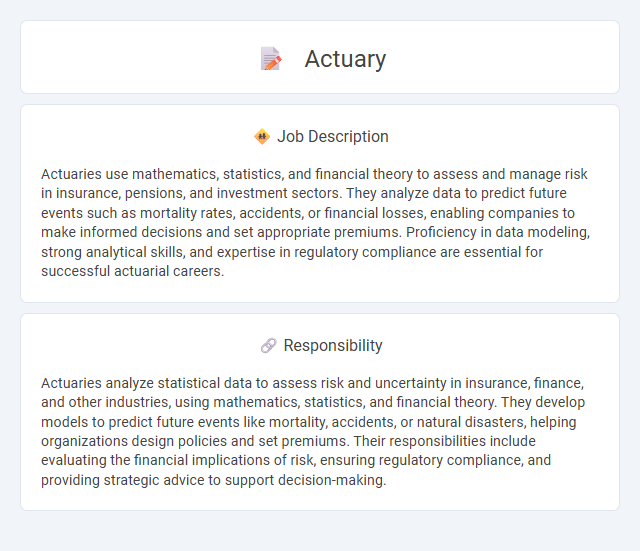
Actuaries use mathematics, statistics, and financial theory to assess and manage risk in insurance, pensions, and investment sectors. They analyze data to predict future events such as mortality rates, accidents, or financial losses, enabling companies to make informed decisions and set appropriate premiums. Proficiency in data modeling, strong analytical skills, and expertise in regulatory compliance are essential for successful actuarial careers.
Individuals who have strong analytical skills, a passion for mathematics, and a keen attention to detail are more likely to be suitable for an actuary career. People comfortable with data analysis, risk assessment, and problem-solving may find this profession aligns well with their abilities and interests. Those who prefer dynamic environments with frequent interpersonal interaction might be less inclined to thrive as actuaries due to the often solitary and technical nature of the work.
Qualification
Actuaries require a strong foundation in mathematics, statistics, and financial theory, often demonstrated through a bachelor's degree in actuarial science, mathematics, or related fields. Professional certification from recognized bodies such as the Society of Actuaries (SOA) or the Casualty Actuarial Society (CAS) is essential, involving a series of rigorous exams and modules covering probability, financial mathematics, and risk management. Continuous professional development and proficiency in data analysis software like Excel, R, or Python enhance an actuary's ability to evaluate financial risks accurately.
Responsibility
Actuaries analyze statistical data to assess risk and uncertainty in insurance, finance, and other industries, using mathematics, statistics, and financial theory. They develop models to predict future events like mortality, accidents, or natural disasters, helping organizations design policies and set premiums. Their responsibilities include evaluating the financial implications of risk, ensuring regulatory compliance, and providing strategic advice to support decision-making.
Benefit
Actuary jobs likely offer significant benefits including competitive salaries and strong job security due to high demand in insurance, finance, and consulting industries. Professionals in this field probably enjoy opportunities for career advancement and specialized certifications that enhance earning potential. Employers often provide comprehensive benefits packages such as health insurance, retirement plans, and flexible work environments.
Challenge
Actuary jobs often involve complex problem-solving tasks that require strong analytical skills and attention to detail. The challenge likely lies in interpreting vast amounts of data to predict financial risks accurately under uncertain conditions. Success in this role probably depends on the ability to adapt to evolving regulations and economic environments.
Career Advancement
Actuaries experience consistent career advancement through roles such as Associate Actuary, Fellow, and specialized positions in risk management, pension planning, and insurance underwriting. Achieving professional certifications from organizations like the Society of Actuaries (SOA) or Casualty Actuarial Society (CAS) significantly accelerates promotion opportunities and salary increases. Leadership positions, including Chief Actuary or risk consulting director, become attainable with accumulated expertise and advanced analytical skills.
 kuljobs.com
kuljobs.com